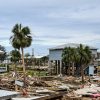Record-setting heat in Texas has sent hundreds of people to emergency rooms in recent weeks, according to state health officials. Temperature records fell across the state during the last two weeks, putting June 2023 on pace to be the hottest June ever in some parts of the state. From the border city of Del Rio to the capital city, Austin, temperatures hit triple digits for days straight.
Emergency medical providers are responding to heat-related illnesses as extreme temperatures become more frequent and prolonged. On June 20, at least 350 people visited emergency departments across Texas because of heat illnesses, according to state health officials. That was the highest number of ER visits for heat-related illnesses on any single day in 2022 or 2023 so far. Not all hospitals and clinics are included in the state data, so the total is probably an undercount.
Emergency Medical Services (EMS) in Texas cities also reported high numbers of calls for heat-related illnesses this month. Houston EMS fielded 416 calls related to heat illnesses in the first 23 days of June. Even Texans accustomed to hot weather have been taken aback by the dangerous conditions.
“We are on pace to beat our numbers from last June,” said Austin-Travis county EMS paramedic and spokesperson Christa Stedman. “And that was the hottest June on record.”
Hotter summers linked to climate change have a deadly toll in Texas. Chris Mendoza, who owns a food truck in El Paso, experienced heatstroke from working inside the truck. Now, he has set a rule for his truck: once the internal temperature reaches 140 degrees Fahrenheit, they shut down.

On Monday, the high temperature in El Paso was 110 degrees Fahrenheit; inside the food truck was even hotter. Mendoza suspended service for an hour because it was too hot to work safely. “I’d rather lose a customer than make a burger, because I care more about people’s health than the profit,” he said.
The heatwave has posed a health risk to millions of Texans, especially those who work outside or are homeless. While final autopsies are still pending, several deaths have already been linked to the extreme heat. The heat has also posed a risk to migrants crossing the US-Mexico border.
Climate change made the extreme heatwave more likely to occur, according to the Climate Shift Index, a tool developed by the science non-profit Climate Central to estimate how much more likely a specific weather event is because of climate change. The Climate Shift Index analyzes the temperatures of a 31-day period surrounding a specific date in our current climate and removes the signal of global warming to assess how frequent those temperatures would be in a world where “humans hadn’t put a lot of things in the atmosphere and warmed things up.”
The recent heatwave scored five, meaning it was five or more times likelier because of climate change. “At that level, you are looking at an event that is highly, highly unlikely without climate change,” said Andrew Pershing, vice-president for science at Climate Central.
As the summer continues, the heat-related deaths could continue to rise. Emergency medical professionals are responding to more heat-related illnesses, treating patients with symptoms of heatstroke or exhaustion. Dr. Auden Velasquez, a family doctor at Pecos county memorial hospital in Fort Stockton, said West Texans were generally prepared for extreme heat. “It’s something that we expect and people are smart about it,” Velasquez said. “But certain people don’t have the option of getting out of the sun, like oilfield workers or construction workers.”
High temperatures in Fort Stockon, midway between El Paso and San Antonio, have fluctuated between 100 and 110 degrees Fahrenheit for the past week. Velasquez said the hospital also treats patients who have crossed the US-Mexico border and are brought in by the border patrol after they suffered heat illnesses.
EMS providers across the state have reported high numbers of heat-related 911 calls this month. Houston EMS responded to 416 heat-related calls between June 1 and 23. San Antonio EMS fielded 234 calls for heat-related health problems between June 1 and 25, compared with 163 during the same period in 2022.

